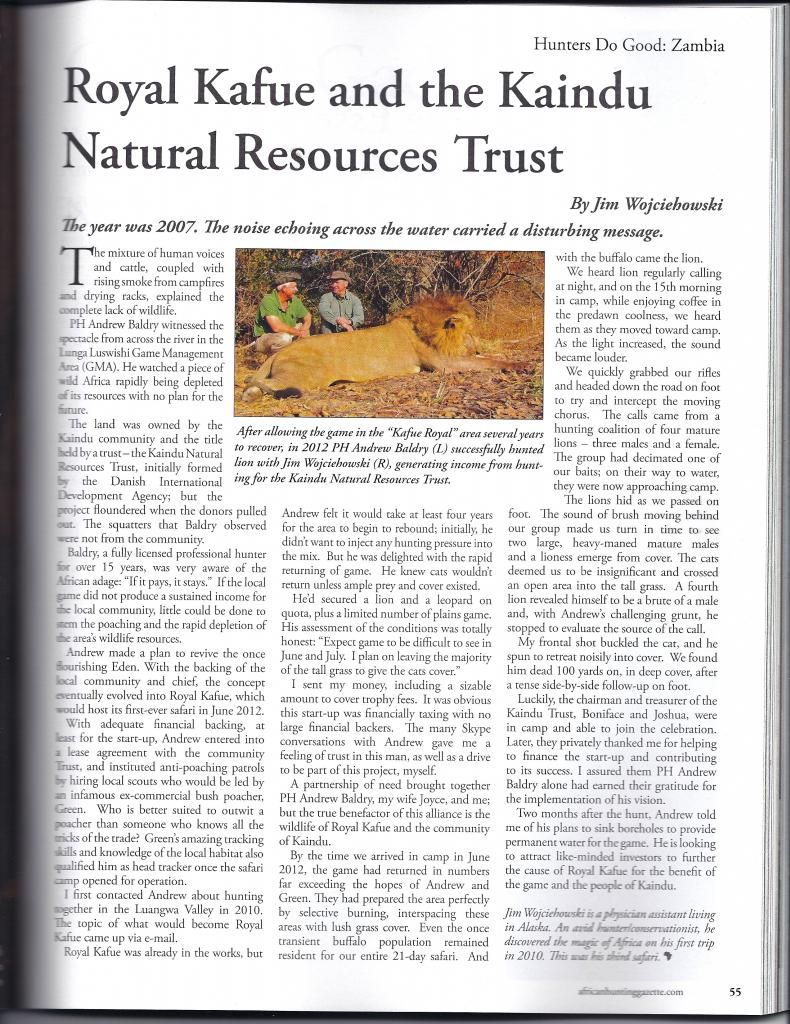17 February 2014, 22:54
D. NelsonInfo for Nephew's Report
My newphew (actually my grand/great nephew) is doing a school report on the benefits of hunting to the local communities in Africa.
Can anyone direct me to a source or sources of specific info on the benefits of hunting to the local communities?
Thank you in advance, D. Nelson
17 February 2014, 23:13
FrostbitDarin,
Not sure this would help but it's an article I wrote for the African Hunting Gazette in the issue with the Puku on the cover.
The area Andrew and I hunted was essentially poached out just 2-3 years before we had our successful Safari. Per haps Andrew would be willing to also chime in for the lad's report.

17 February 2014, 23:31
D. NelsonThanks, Jim. Every bit helps. I'll print it out for him.
Regards, Darin
17 February 2014, 23:40
P-A ÅhlénHe can probably find some usefull info in this link
http://cmsdata.iucn.org/downlo...g_ver1_09aug2012.pdf18 February 2014, 01:38
impala#03Take a look at
http://yeswehunt.eu. You may have to look around the site a bit, but there was a very good article entitled, Does Africa Need Huntinig?, that was excellent.
18 February 2014, 02:16
SteveGlIt's always best to go to primary sources, both because the data is more reliable and the report will be much more impressive.
CAMPFIRE Zimbabwe and NACSO Namibia each have websites which extol the virtues of hunting, conservation and community benefits. The NACSO website is much more comprehensive but you can get lost trying to find what you’re looking for (I do all the time).
The CAMPFIRE website is much easier to navigate and has one page devoted to HUNTING. The first couple of paragraphs are quoted below.
Another excellent source would be the interview with Dr. Bandile Mkhize, (CEO of Ezemvelo Wildlife in Kwa-Zulu Natal), in Zig’s film The White Rhino. A couple of direct quotes from that should really impress the teacher. The interview begins at about 26 minutes in to the film.
The White Rhino: A Conservation Success Story:
http://vimeo.com/user17366897/.../62993549/5d4c0a42b3CAMPFIRE (Community Areas Management Programme for Indigenous Resources) Zimbabwe
http://www.campfirezimbabwe.org/CAMPFIRE Hunting page:
http://www.campfirezimbabwe.or...icle&id=76&Itemid=85Namibian Association of Community Based Natural Resource Management (CBNRM) Support Organisations (NACSO):
http://www.nacso.org.na/index.php:: :: ::
From The CAMPFIRE Zimbabwe website: Hunting is Low-Impact Tourism
For thousands of years, rural Africans have relied on plentiful supplies of impala and other game animals for meat, clothing and income. Ironically, rural Zimbabweans have recently begun laying down their spears and bows, whilst at the same time encouraging foreign hunters to hunt elephants, buffaloes, lions or other wild animals on their lands. The reason is a simple matter of economics - foreign sport hunters will pay large sums to hunt Africa's trophy animals, far more than other tourists will pay to view them. A single hunter can spend more than US $40,000 on a trophy hunting trip. Under the CAMPFIRE programme, at least half of that revenue goes to the local communities for rural development and environmental conservation.
At the moment, CAMPFIRE depends on hunting revenues which contribute over 90% of total income to the districts and communities participating in the programme. In 1993, twelve districts participating in CAMPFIRE, with a human population of nearly 400,000 people, earned US $1,516,693 from trophy fees. This is a small sum per individual on average, but some resource rich areas earn disproportionate amounts and even small sums of cash can create meaningful infrastructure when well invested.
Many communal lands in Zimbabwe lack tourist infrastructure and are unsuitable for photographic tourism. A combination of low game population density and thick bush often means that it is hard to get good sightings of wildlife. However, wealthy people (predominantly from the USA, Germany and Spain) are keen to hunt there to help communities.
Trophy hunters have a much lower impact on the environment than other tourists. They consume a much smaller proportion of resources (such as water), are happy with the most basic infrastructure, and tend to travel in small numbers. All foreign sportsmen have to be accompanied by a licensed professional hunter, who acts as a guide and is trained in wildlife management and skilled at tracking and hunting with minimum disturbance to the wildlife and its habitat. A national parks game scout accompanies hunters to ensure that quotas are observed, and hunting is banned between dusk and dawn. ... continues ...
18 February 2014, 02:21
D. NelsonThanks, guys! This is just the type of info he needs!
Regards, D. Nelson
18 February 2014, 07:20
Ackley Improved UserThis is a great video...maybe your nephrew could show it to his classmates.
http://www.hunterproud.com/wp-.../Bubye-Valley-11.movwhich can be found in this AR link under a post by Zig Mackintosh
http://forums.accuratereloadin...1002751/m/7651018681You'll likely need to go to the above AR forums thread and click the first link to get the video going.
AIU
18 February 2014, 09:31
twoseventyResponses like these on this thread makes me appreciate you guys on AR.
Tom
